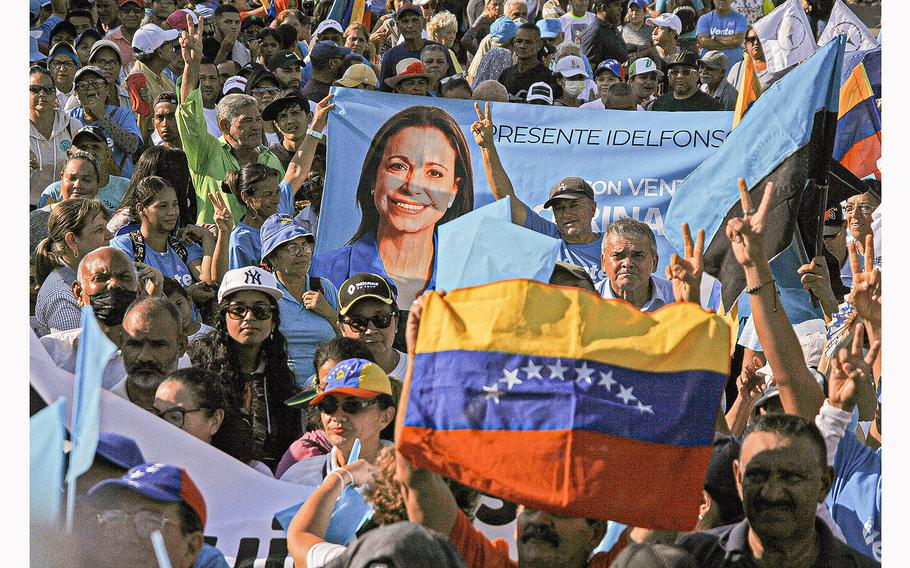Americas
US to reimpose sanctions on Venezuela if there’s no action on hostages, elections
Miami Herald November 28, 2023

A gathering of supporters turn out for a Maria Corina Machado political rally in Maracaibo, Venezuela, on Nov. 28, 2023. (Zuma Press/TNS)
WASHINGTON (Tribune News Service) — The Biden administration will stick to its promise to reimpose sanctions on Nicolás Maduro’s regime in Venezuela unless he takes concrete actions no later than Thursday to release U.S. hostages and begin democratic reforms, a White House official told McClatchy.
The White House eased sanctions on the country’s oil sector last month after Maduro agreed in principle with Venezuela’s opposition platform to allow a competitive presidential election to proceed next year.
But Biden administration officials set two conditions on the U.S. sanctions relief at the time, and told Maduro he had to meet both by Nov. 30.
Maduro first must “begin the release” of all American hostages currently detained in the country, according to a statement released by the White House. Three U.S. citizens in are designated as wrongfully detained, and more are being held there, including one who was abducted within hours of the October agreement.
Second, Maduro must “define a specific timeline and process for the expedited reinstatement of all candidates” who want to run for president, ensuring their freedom of movement and physical safety.
Juan Gonzalez, senior director for the Western Hemisphere at the National Security Council, stated publicly that this must include María Corina Machado, who is widely considered the most viable competitor to Maduro in a free and democratic election.
A White House official told McClatchy on Tuesday that the administration is committed to the Nov. 30 deadline. “Our statement still holds,” the official said.
The U.S. government has been waiting for Caracas’ socialist regime to comply with the commitments it made in a series of negotiations held throughout the year with members of the Biden administration. The talks culminated in the signing last month in Barbados of an accord with opposition leaders to hold presidential elections next year.
Those commitments included allowing any opposition leader to compete, implementing deep reforms to the often criticized electoral system, allowing international observers to monitor the election and freeing all political prisoners.
In exchange, the administration granted a six-month general license temporarily authorizing U.S. transactions involving the oil and gas sector in Venezuela, and a second general license authorizing the operations of state-run Minerven, a previously sanctioned gold-mining enterprise that had been trading on the black market.
According to press reports, Maduro has already taken steps to take advantage of the new licenses, setting up a number of tentative deals with international oil companies to boost the country’s production.
In addition to Spain’s Repsol and Italy’s Eni, which already have been working with Venezuela on gas projects for some time, French company Maurel & Prom announced that it will be resuming operations in Lake Maracaibo, in eastern Venezuela, Spanish newspaper El Pais reported.
Other companies looking to return to the South American country include China Petroleum and Indian Oil, which have already contacted Caracas, while Maduro officials have confirmed talks to develop gas projects with Colombia’s Ecopetrol.
And yet, the Maduro regime has shown few signs it is willing to uphold its side of the October agreement with Washington.
Instead of lifting its ban prohibiting a number of top opposition leaders from running for public office – as was expected – the Venezuelan government, through its Supreme Court, issued a new ruling dismantling the results of a primary election held by the opposition last month, in which Machado won more than 92% of the vote.
That was seen in the United States as a sign that Maduro has no intention of keeping his word.
“It’s taken them just two weeks to violate” the agreement, Florida U.S. Sen. Marco Rubio told Secretary of State Antony Blinken in a recent Senate hearing. “They canceled the opposition’s primary election and they continue to ban the winner of the primary. They basically wiped out the election. They’ve broken the deal.
“Are we going to reimpose sanctions?” the senator asked.
That option is on the table, Blinken replied.
“They’re not getting a free pass for actions they take that are in contradiction to the commitments that they’ve made to move toward free and fair elections,” he said. “We’re tracking that very carefully, and happy to come back to you further as this moves along.”
©2023 Miami Herald.
Visit at miamiherald.com
Distributed by Tribune Content Agency, LLC.